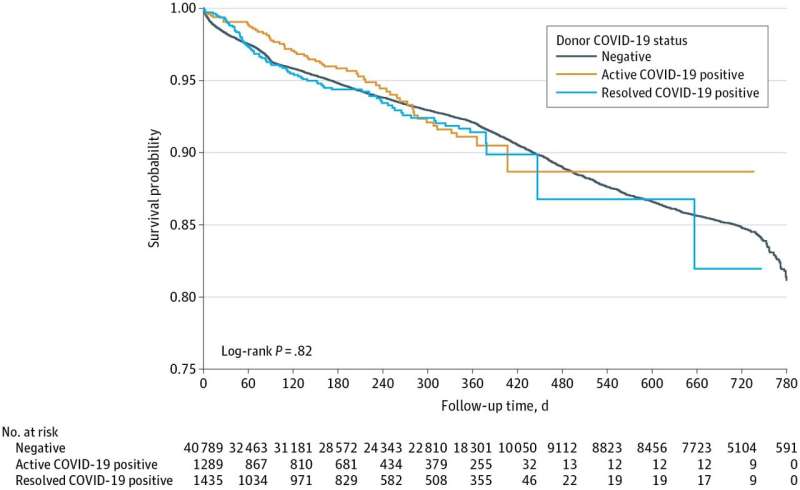This article has been reviewed according to Science X's editorial process and policies. Editors have highlighted the following attributes while ensuring the content's credibility:
fact-checked
peer-reviewed publication
trusted source
proofread
Donated kidneys from deceased COVID-19 patients are safe to transplant, according to study

Kidneys from organ donors who were diagnosed with COVID-19 are safe to transplant and don't transmit the virus to people who receive those organs, according to a new study led by researchers at Washington University School of Medicine in St. Louis.
Of the many thousands of kidneys transplanted since the start of the COVID-19 pandemic, there have been no reported infections after transplant surgery related to kidneys donated by people who died and had tested positive for the virus. Most donors died of causes other than COVID-19, but even in those who had tested positive for the virus within a week of their deaths, there was no effect on the success of the transplants.
The findings are published in the journal JAMA Network Open.
Initially, the pandemic contributed to a substantial decrease in organ transplants generally, and kidney transplant rates led the way, falling by 50% in the United States during the early months of the pandemic. This was the biggest decline among all solid organs transplanted. At that time, patients who tested positive for COVID-19 were not eligible to donate any of their organs. Their organs were discarded out of concern that they could spread the virus to patients receiving transplants.
"However, as the COVID-19 era has progressed, we have found that kidneys from donors with COVID-19 have a very low chance of transmitting the virus; in fact, we don't know of a single instance where that has occurred," said Tarek Alhamad, MD, the medical director of transplant nephrology in the Division of Nephrology. "These findings suggest to us that, with so many people waiting for transplants, we should not discard kidneys from deceased people infected with COVID-19, because the organs and the people who receive them do well after transplant surgery."
Analyzing data collected by the United Network for Organ Sharing (UNOS) transplant registry and involving more than 35,000 kidney donors, Alhamad and his team found that kidneys from people who had tested positive for COVID-19 within a week of donation often were not used. But as the pandemic wore on, transplant providers were more likely to transplant such organs, and by 2022, organs from donors whose COVID-19 infections had resolved were turned away less frequently. This year, kidneys are being transplanted from deceased donors who had been diagnosed with active COVID-19 infections within a week of donation.
"We found no higher risk of graft failure or of patient death in those who got kidneys from COVID-19-positive donors," said Alhamad, who is also an associate professor of medicine and director of the kidney and pancreas transplant programs at Barnes-Jewish Hospital. "COVID-19 was not associated with rejection of the organ, with longer hospitalization after surgery or with delays in the function of kidneys after transplant surgery. And as far out as two years after transplant, those organs were functioning as well as kidneys from donors who did not have COVID-19."
During the early days of the pandemic, when many kidneys from COVID-positive donors were discarded, the number of deaths among those on waiting lists for new kidneys rose by 43%. Researchers in France estimated that almost three-quarters of the deaths of those on wait lists resulted from the pandemic.
Previously, kidneys from donors with hepatitis C also were used less frequently. When those organs were transplanted, they were transplanted only into patients who also were positive for the hepatitis C virus. But in a recent paper published in the American Journal of Transplantation, Alhamad and his colleagues reported that that virus also had little effect on the success of kidney transplant surgery. As new, more effective treatments for hepatitis C have been able to cure more than 95% of patients with the virus, donor kidneys that would have been of limited usefulness in the past now can be given to some of the many thousands of patients on transplant waiting lists around the country.
According to the American Kidney Fund, there are more than 106,000 people in the United States on waiting lists for organ transplants, with 92,000 of them (87%) waiting for a kidney.
"In some places, the wait can last for 10 years, and many dialysis patients eventually die while waiting for a kidney," Alhamad said. "Meanwhile, we've seen many organs that previously were deemed unsafe due to the donor having hepatitis C or COVID-19 actually prove to be useful and to function just as well as kidneys from people not infected with those viruses. Our research confirms that most of these kidneys are viable, and it is critical that they be used to help patients currently waiting desperately for kidney transplants."
More information: Mengmeng Ji et al, Patterns in Use and Transplant Outcomes Among Adult Recipients of Kidneys From Deceased Donors With COVID-19, JAMA Network Open (2023). DOI: 10.1001/jamanetworkopen.2023.15908





















